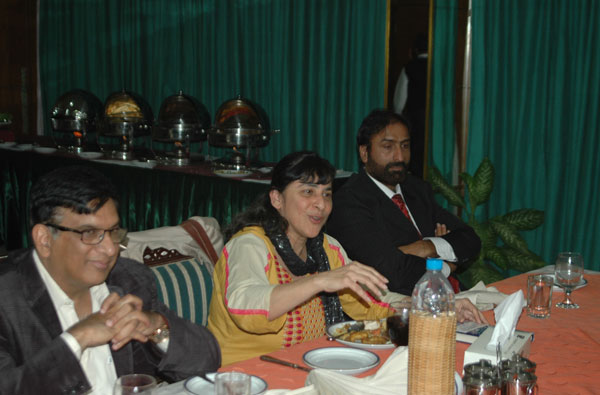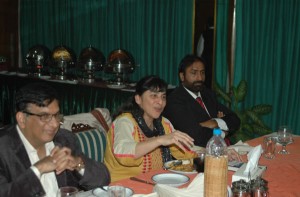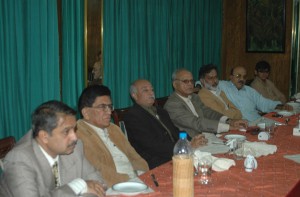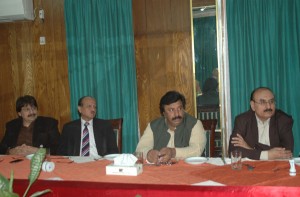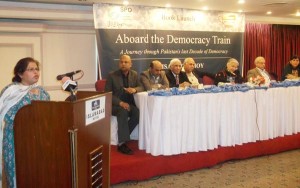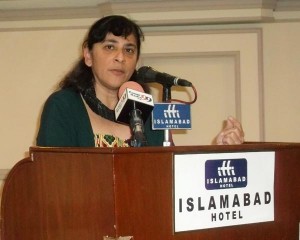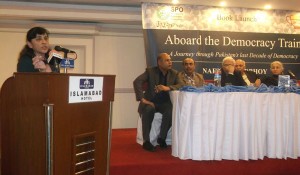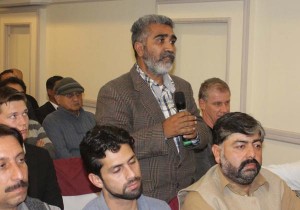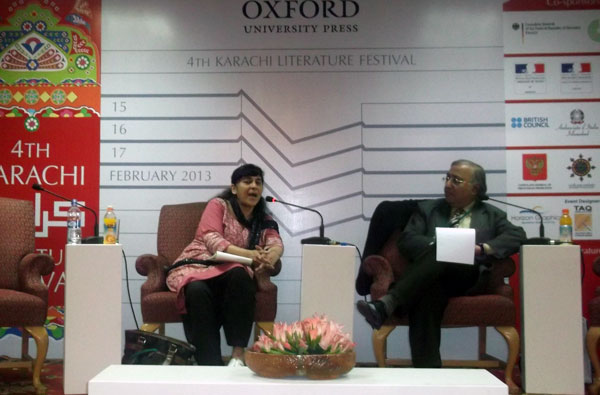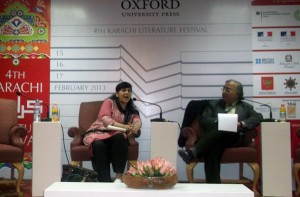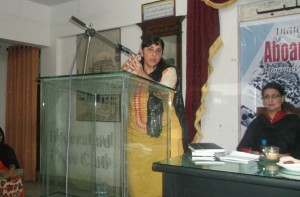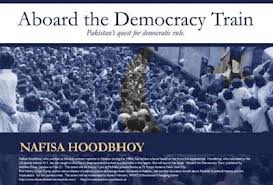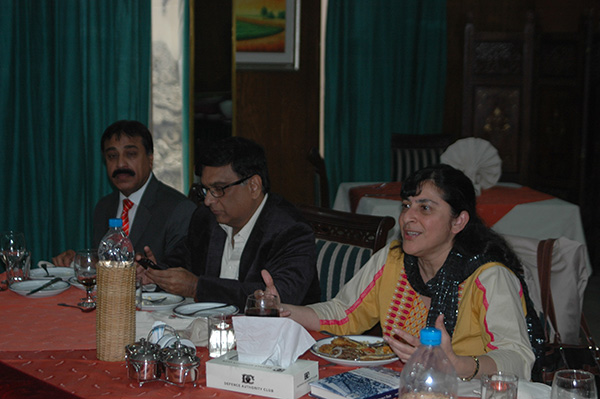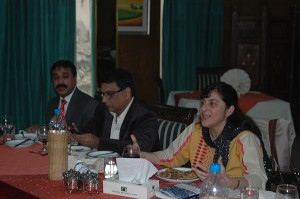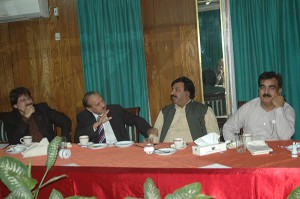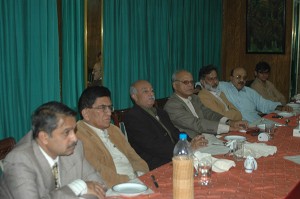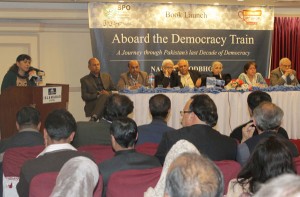
At the book launch of Nafisa Hoodbhoy ‘Aboard the Democracy Train’ in Islamabad, the speakers who mostly belonged to Karachi and had seen the Pakistan that was before Zia-ul-Haq’s Marshal Law in 1977 reminisced the events led to Marshal Law, life during Zia’s brutal regime, the emergence of MQM and the ruthless tactics used by Jamat-i-Islami, one of the Islamist parties of Pakistan, using its student wing at Karachi University.
Dr. Ayesha Siddiqa argued and believed that the situation might have been the same today if Zia had not grabbed power through a military coup. “We blame Zia for everything but what would we do if Zia had not imposed Marshall Law and dethroned a political government? Who would we blame then for the current mess Pakistan is in?” To which Khawar Mumtaz, chairperson on the status of women said that things would not have been that bad if Zia had not toppled a democratically elected government and brought a reign of terror that fed on religiosity. The speakers and the attendants seemed to agree with Ms. Mumtaz.
There is no doubt that after the demise of General Zia, Pakistan remains clearly divided between two distinct blocks; one associating itself with Bhutto, the other linking with Zia.
The block representing Zia is taking hold of Pakistan when the space for Bhutto is shrinking. The incident of Badami Baagh in Lahore, where the entire locality of Christians was turned into ashes on the spur of a moment, is a manifestation of that reality. The incessant attacks on Shias, Hindus and Ahmadis in Pakistan indicate that people belonging to Zia’s block hold the strings of lives of ordinary Pakistanis in their hands. The militancy and religious extremism nurtured by Zia is making it impossible for people of other faiths to live in Pakistan. The sunlight is receding and the shadows increasing.
The word ‘liberal’ and ‘secular’ has become an abusive term in Pakistan, which can explain the dominance of Zia’s followers better, is the weakness of Bhutto’s own party. They could not challenge or confront the radical elements belonging to Zia’s block on matters as small as, for instance, unblocking access to the popular video sharing website, Youtube. Who could have foreseen during the time of Zulfiqar Ali Bhutto that one day his own party, with liberal inclinations running the government, would feel so weak and powerless against radical forces that it would dither in its decision of opening the website.
Bhutto was a symbol of modernity for the state of Pakistan; Zia represented extremism and dictatorship and made Pakistan an entity of hatred where only Muslims of a certain school of thought could live and where the more illogical is the most appreciated and accepted. He clearly turned Pakistan into a laboratory of a radical Islam, which the religious forces had dreamed of; a laboratory which produces militant groups that silence any voice remotely connected with modernity and liberalism. What crime had hundreds of Shias committed? What crime had Salman Tasir and Shahbaz Bhatti committed, who got killed in Islamabad and then the killer of Salman Tasir was garlanded with flowers not by people in the tribal belt or Baluchistan, who are portrayed as the barbaric ones in love with backwardness and terrorisms and away from any signs of modernity, but in the heart of Pakistan, Rawalpindi.
The armed groups, the Sipahs and the lashkars are so many that at times it feels as if these groups are the defenders of security in Pakistan, not the military of that country. And why not so, when the military is more into its commercial enterprises and money making, than doing its duty to defend the country and its people. The military in Pakistan runs businesses ranging from Banks to cement factories and its economy is worth more than 10 billion dollars. Dr. Ayesha Siddiqa wrote a book on military economy ‘Military Inc’ Inside Pakistan’s Military Economy.
When I see campaigns and banners demanding for Jinnah’s Pakistan, I ask myself, isn’t today’s Pakistan, in fact, Jinnah’s Pakistan, as confused and disoriented as Jinnah himself was. He had no idea what kind of Pakistan he wanted, a theocratic State of which he expressed his desire several times or a liberal democratic State of which he mentioned in his speech right before the birth of Pakistan in 1947. His decision to declare Urdu as the national language awarded a tool in the hands of oppressors who set the ground for alienation and separation. The language was later used by the Punjab dominated ruling elite, led by Pakistani military, against other ethnicities like the Pashtuns and the Balochs.
Because of the poor vision and short sightedness of the founding fathers of Pakistan, millions were uprooted from their origin, their villages, cities, their hearths and homes, their friends and their dreams. Ironically, those who were uprooted and who actually steered the Pakistan movement, are to this day called Muhajir which means refugees and more derogatively Biharis—the people from Bihar.
Bhutto can never be more relevant than in today’s Pakistan. When I say “Bhutto” I do not refer to the person “Bhutto” or his party but the philosophy of modernity, liberalism and secular beliefs that existed in the pre-Zia Pakistan. With the arrival of Zia, a raj of shadows descended on Pakistan. Time for change has come as it is the only permanence in the world. What the shrinking majority of Pakistan wants is the Pakistan of Bhutto, clear in its direction and outlook, a modern, democratic and secular Pakistan that is unfortunately losing its ground to the onslaught of Zia’s block.


